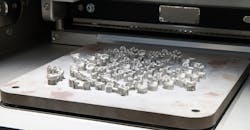ASTM Backs New Research for Additive Manufacturing
ASTM International is funding new research to expedite the development of industrial standards for additive manufacturing (AM, or 3D printing.) The investment includes additional in-kind contributions that will support the ASTM International Additive Manufacturing Center of Excellence (AM CoE) goal of aligning technical standardization with the evolving AM industry.
ASTM develops and publishes technical standards for materials, products, systems, and services.
Each of the projects being supported will address one or more standardization gaps listed in the AMSC (Additive Manufacturing Standardization Collaborative) roadmap published by ANSI/America Makes.
“We are thrilled to support these crucial and high-impact research projects in additive manufacturing that seek to accelerate standardization,” stated Dr. Mohsen Seifi, ASTM Intl.'s director of global additive manufacturing programs. “These eight projects will join the 14 existing projects that address the AM CoE’s high-priority research areas for standardization, including design, data, modeling, feedstock, processes, post processing, testing, and qualification.”
During 2020 over 60 ideas for projects have been submitted for consideration by ASTM International members. Eight proposals were chosen for further development by the ASTM executive section eight ideas focused on research and innovation (F42.90.05) in AM technologies (F42).
The AM CoE partners will conduct these projects:
• Auburn University will develop a standard coupon design for evaluating lattice structures in metal AM under compressive loading. This work will improve reliability of lattice structures used in applications ranging from bone ingrowth for medical implants to weigh reduction in transportation structures.
• EWI, an applied technology group, will develop a common data exchange format (CDEF) for powder characterization, to link different data-management systems for efficient data sharing throughout the AM supply chain.
• The UK-based Manufacturing Technology Centre (MTC) will develop standard for evaluating polymer powders during recycling and re-use in AM, to improve confidence for manufacturing with recycled powders.
• MTC also will lead a project to develop guidance on metal powder feedstock sampling and recycling strategies. This research will identify strategies currently used for sampling and recycling powder feedstock and provide guidance on the suitability of these methods for AM processes, materials, and end-use applications.
• The Singapore National Additive Manufacturing Innovation Cluster (NAMIC) and Institute of Manufacturing Technology (SIMTech) will develop standard, sub-sized tensile specimens for witness testing of metal AM. These specimens will reduce the time and material costs of witness testing, a method of monitoring build quality by testing a coupon printed alongside the components in an AM build.
• NAMIC and A*Star’s National Metrology Centre of Singapore will develop standard guidance for volume traceability of non-destructive testing of metal components produced with powder-bed fusion and binder jetting. This project will assess components made with both processes and will provide guidance for use in assessing part quality.
• NAMIC and the Singapore University of Technology and Design (SUTD) will conduct a study of maraging steel, an alloy commonly used by automotive, aerospace, sporting goods, and tooling industries, among others. This work will provide a basis for developing a material specification for this class of alloys in AM applications.
• NASA and Auburn University will design a series of test components and a methodology to assist validation of process parameters for powder bed fusion. The proposed test components will enable manufacturers to confirm that a parameter set is robust and produces suitable part quality across a variety of local thermal conditions by incorporating challenging geometries.
• Wichita State University’s National Institute for Aviation Research (NIAR) will continue two projects started in a previous research round. The first project will provide guidance for polymer design values in additive manufacturing, while the second project establishes coupon-part property relationships for dynamic testing of additively manufactured polymers.
More information and details on each project are available at www.amcoe.org.
